The beginning of the Franco-Prussian war. Plans and the state of the French army
The main reason that led to the fall of the Second Empire was the war with Prussia and the catastrophic defeat of Napoleon III’s army. The French government, given the strengthening of the opposition movement in the country, decided to solve the problem in the traditional way - to channel discontent with the help of war. In addition, Paris solved strategic and economic tasks. France fought for leadership in Europe, who was challenged by Prussia. The Prussians defeated Denmark and Austria (1864, 1866) and resolutely went towards the unification of Germany. The emergence of a new, strong united Germany was a strong blow to the ambitions of the regime of Napoleon III. United Germany threatened the interests of the French big bourgeoisie.
It is also worth considering that in Paris they were confident in the strength of their army and victory. The French leadership underestimated the enemy; an appropriate analysis of the latest military reforms in Prussia and changes in attitudes in German society, where this war was perceived as fair, was not carried out. In Paris, they were confident of victory and even hoped to reject a number of lands on the Rhine, expanding their influence in Germany.
At the same time, internal conflict was one of the leading reasons for the government’s desire to start a war. One of Napoleon III’s advisers, Sylvester de Sassi, regarding the motives that pushed the government of the Second Empire in July 1870 to go to war with Prussia, wrote many years later: “I did not resist external war, because it seemed to be the last resource and the only means of salvation for the empire ... On all sides, the most formidable signs of civil and social war appeared ... The bourgeoisie was obsessed with some sort of insatiable revolutionary liberalism, and the population of the workers of the cities was socialism. It was then that the emperor ventured on a decisive bet - on the war against Prussia. ”
Thus, Paris decided to start a war with Prussia. The reason for the war was the conflict that arose between the two great powers because of the candidacy of the Prussian prince Leopold Hohenzollern for the vacant royal throne in Spain. 6 July, three days after it became known in Paris about the consent of Prince Leopold to accept the throne offered to him, French Foreign Minister Gramont made a statement in the Legislative Corps, which sounded like an official call to Prussia. “We do not think,” said Gramont, “that respect for the rights of neighboring people obliges us to tolerate so that an outside power, by placing one of its princes on the throne of Charles V ..., could disrupt the existing balance of power in Europe to the detriment of us and put threat to the interests and honor of France ... ". In the event that such an “opportunity” came true, Gramont continued, “then“ by your support and the support of the nation, we will be able to fulfill our duty without hesitation and weakness ”. It was a direct threat of war if Berlin did not abandon its plans.
On the same day, July 6, at the meeting of the Council of Ministers, the French Minister of War, Lebefé, made an official statement on the full readiness of the Second Empire for war. Napoleon III announced the diplomatic correspondence of 1869 between the governments of France, Austria and Italy, which created the false impression that the Second Empire, entering the war, can count on the support of Austria and Italy. In reality, France did not have allies in the international arena.
The Austrian Empire, after being defeated in the Austro-Prussian 1866 war of the year, wanted a rematch, but Vienna needed time to build up. The Prussian Blitzkrieg did not allow Vienna to take a tougher stance against Berlin. And after the battle of Sedan in Austria, they completely buried the thoughts about the war against the entire North German alliance, led by Prussia. In addition, the position of the Russian Empire was a deterrent for Austria-Hungary. Russia, after the Crimean War, when Austria took a hostile position, did not miss the opportunity to repay the former treacherous ally. It was possible that Russia would intervene in the war if Austria attacks Prussia.
Italy remembered that France did not bring the 1859 war to a victorious end, when the forces of the Franco-Sardinian coalition smashed the Austrians. In addition, France still held Rome, its garrison was located in this city. The Italians wanted to unite their country, including Rome, but France did not allow it. Thus, the French prevented the completion of the unification of Italy. France was not going to withdraw its garrison from Rome, thus it lost a possible ally. Therefore, the proposal of Bismarck to the Italian king to maintain neutrality in the war of Prussia with France, was received favorably.
Russia, after the eastern (Crimean) war, focused on Prussia. Petersburg did not intervene in the 1864 and 1866 wars, Russia did not intervene in the Franco-Prussian war either. In addition, Napoleon III, before the war, did not seek friendship and alliance with Russia. Only after the outbreak of hostilities, Adolf Thier was sent to Petersburg, who asked for Russia's intervention in the war with Prussia. But it was too late. Petersburg hoped that after the war, Bismarck would thank Russia for its neutrality, which would lead to the abolition of the restrictive articles of the Paris world of 1856. Therefore, at the very beginning of the Franco-Prussian war, a Russian declaration of neutrality was issued.
The British also decided not to intervene in the war. According to London, the time has come to limit France, since the colonial interests of the British Empire and the Second Empire clashed around the world. France has made efforts to strengthen fleet. In addition, Paris claimed to Luxembourg and Belgium, which were under the auspices of Britain. England was the guarantor of the independence of Belgium. Great Britain saw nothing wrong with strengthening Prussia to create a counterweight to France.
Prussia also sought war to complete the unification of Germany, which was hampered by France. Prussia wanted to seize the industrialized Alsace and Lorraine, and also to occupy a leading position in Europe, for which it was necessary to defeat the Second Empire. Bismarck since the time of the Austro-Prussian War 1866 was convinced of the inevitability of an armed conflict with France. “I was firmly convinced,” he wrote later, referring to this period, “that on the way to our further national development, both intensive and extensive, on the other side of Mayne, it will inevitably have to wage war with France, and that in our inner and Under no circumstances should we lose sight of this opportunity. ” In May, 1867, Mr. Bismarck, frankly announced in a circle of his supporters about the impending war with France, which will be launched when "when our new army corps is strengthened and when we have stronger relations with various German states."
However, Bismarck did not want Prussia to look like an aggressor, which led to a complication of relations with other countries and had a negative effect on public opinion in Germany itself. It was necessary that France itself began the war. And he was able to crank this thing. The conflict between France and Prussia over the candidacy of Prince Leopold Hohenzollern was used by Bismarck to provoke further exacerbation of Franco-Prussian relations and the declaration of war by France. For this purpose, Bismarck resorted to gross falsification of the text of the dispatch sent to him on July 13 from Ems by the Prussian King Wilhelm for shipment to Paris. The dispatch contained the answer of the Prussian king to the demand of the French government that he officially endorsed the decision made on the eve of the father of Prince Leopold to abandon the Spanish throne for his son. The French government also demanded that Wilhelm guarantee that such claims would not be repeated in the future. Wilhelm agreed to the first claim and refused to satisfy the second. The text of the response dispatch of the Prussian king was deliberately changed by the Prussian Chancellor in such a way that the dispatch as a result of this acquired an offensive tone for the French.
On July 13, the day the dispatches from Ems arrived in Berlin, Bismarck frankly expressed his dissatisfaction with the conciliatory tone of the dispatches in an interview with Field Marshal Moltke and Prussia’s Military Forces von Roon. “We must fight ...,” said Bismarck, “but success largely depends on the impressions that the war originates for us and for others; it is important that we are the ones who were attacked, and Gallic arrogance and sensitivity will help us in this. ” By falsifying the original text of the so-called Emsk despatch, Bismarck achieved his intended goal. The defiant tone of the edited text of the dispatch played into the hands of the French leadership, who also looked for a reason for aggression. The war was officially declared by France on July 19 1870.
Calculation of mitralieza refi
Plans for the French command. State of the armed forces
Napoleon III planned to launch a campaign by the rapid invasion of French troops into Germany before the completion of the mobilization in Prussia and the connection of the forces of the North German alliance with the troops of the South German states. Such a strategy was facilitated by the fact that the French personnel system allowed a much faster concentration of troops than the Prussian landwehr system. Under the ideal scenario, the successful forcing by French troops across the Rhine violated the entire further mobilization in Prussia, and forced the Prussian command to throw all available forces to Mein, regardless of their readiness. This allowed the French to beat the Prussian units in parts, as they arrived from various parts of the country.
In addition, the French command hoped to seize communications between the north and south of Germany and isolate the North German alliance, preventing the states of southern Germany from joining Prussia and maintaining their neutrality. In the future, the South German states, taking into account their concerns about the unification policy of Prussia, could support France. Also on the side of France, after the successful start of the war, Austria could speak. And after the transition of the strategic initiative to France, Italy could have acted on its side.
Thus, France was counting on a blitzkrieg. The rapid movement of the French army was to lead to the military and diplomatic success of the Second Empire. The French did not want to drag out the war, as the protracted war led to the destabilization of the internal political and economic situation of the empire.
French infantrymen in uniforms of the Franco-Prussian war
Prussian infantry
The problem was that the Second Empire was not ready for war with a serious opponent, and even on its territory. The second empire could only afford the colonial wars, with the obviously weaker adversary. True, in a throne speech at the opening of the 1869 legislative session, Napoleon III argued that the military power of France had reached the "necessary development", and its "military resources are now at a high level corresponding to its world mission." The emperor assured that the French land and naval armed forces "were firmly constituted", that the number of troops under arms was "not inferior to their numbers under previous regimes." "At the same time," he said, "our weapons have been improved, our arsenals and warehouses are full, our reserves are trained, the mobile guard is organized, our fleet is transformed, our fortresses are in good condition." However, this official statement, like other similar statements by Napoleon III and the boastful articles of the French press, were only intended to hide the serious problems of the French armed forces from their own people and the outside world.
The French army was supposed to be ready for the 20 July 1870 march. But when 29 July arrived in Metz, Napoleon III arrived to send troops across the border, the army was not ready for the offensive. Instead of the necessary for the 250-thousand army, which was supposed to be mobilized and concentrated on the border, only 135-140 thousand people turned out to be here: about 100 thousand near Metz and about 40 thousand from Strasbourg. In Chalon, they planned to concentrate 50-th. reserve army to continue to push it to Metz, but it did not have time to collect.
In this way, the French were unable to carry out quick mobilization in order to pull the forces necessary for a successful invasion to the border in time. The time for an almost calm offensive almost to the Rhine, while the German troops were not yet concentrated, was lost.
The problem was that France could not change the outdated system of recruiting the French army. The viciousness of such a system, which Prussia refused as early as 1813, was that it did not provide for early recruitment, in peacetime conditions, of combat-ready military units, which could be used in the same composition during the war. The so-called French peacetime “army corps” (there were seven of them, which corresponded to the seven military districts into which France divided with 1858) were formed from heterogeneous military units located on the territory of the respective military districts. They ceased to exist with the country's transition to martial law. Instead, they began to hastily form combat units from units scattered throughout the country. The result was that the compounds were first disbanded and then re-created. From here confusion, confusion and loss of time. As noted by General Montauban, who before the war with Prussia commanded the 4 Corps, the French command "at the time of entering the war with a power that had been ready for it for a long time, had to disband the troops that were part of large units, and re-create existing ones army corps under the command of the new commanders, who were barely known to the troops and in most cases did not know their troops well ”.
The French command was aware of the weakness of its military system. She showed up during the 1850 military campaigns. Therefore, after the Austro-Prussian War 1866, an attempt was made to reform the mobilization plan of the French army in case of war. However, the new mobilization plan prepared by Marshal Nielem, which was based on the presence of permanent army units suitable for both peacetime and wartime, and also assumed the creation of a mobile guard, was not enforced. This plan remained on paper.
The French are preparing for the defense of the estate, barricading the gate and punching picks embrasures for shooting in the wall
Judging by the orders of the French command from 7 and 11 in July 1870, first there was talk of three armies, they were proposed to be created according to Niel’s mobilization plans. However, after 11 July, the military campaign plan was radically changed: instead of the three armies, one united Rhine army was formed under the supreme command of Napoleon III. As a result, the previously prepared mobilization plan was destroyed and this led to the fact that the Rhine Army, at the time when it had to launch a decisive offensive, was unprepared and incomplete. Due to the absence of a significant part of the formations, the Rhineland army remained inactive at the border. The strategic initiative was given to the enemy without a fight.
Especially slow was the formation of reserves. Military warehouses were, as a rule, at a distance from the places of formation of combat units. To obtain weapon, uniforms and necessary equipment, the reservist had to travel hundreds, and sometimes thousands of kilometers, before he arrived at his destination. Thus, General Winua noted: “During the 1870 war, people who were in reserve regiments of the Zouavas located in the departments of northern France were forced to pass through the whole country in order to take a steamer to Marseille and go to Coleins, Oran, Philiphenville ( Algeria) to receive weapons and equipment, and then return to the part located in the place from which they left. In vain did they make 2 thousand km by rail, two crossings, at least two days each. ” Marshal Canrober drew a similar picture: “A soldier called up at Dunkirk was sent to equip himself in Perpignan or even in Algeria, in order to force him to join his military unit located in Strasbourg.” All this deprived the French army of precious time and created a certain mess.
Therefore, the French command was forced to begin to concentrate on the border mobilized troops before the mobilization of the army was fully completed. These two operations, which were carried out simultaneously, overlapped each other and mutually violated each other. This was promoted by the erratic operation of the railways, the preliminary plan of which military transport was also disrupted. On the railways of France in July-August, 1870 was dominated by a picture of confusion and confusion. She was well described by the historian A. Shyuke: “Headquarters and administrative departments, artillery and engineering troops, infantry and cavalry, personnel and reserve units, were packed into trains to failure. People, horses, the material part, the provisions - all this in great disarray and confusion was unloaded at the main assembly points. For a number of days, the railway station in Metz presented a picture of chaos, which seemed impossible to sort out. People did not dare to free the cars; the arriving supplies were unloaded and then loaded again into the same trains to be sent to another point. From the station, hay was shipped to city stores, while it was shipped from warehouses to train stations. ”
Frequently, trains with troops were delayed on the way due to the lack of accurate information about their destination. In some cases, the troops changed their concentration points several times. For example, the 3 Corps, which was to be formed in Metz, received an unexpected order on July 24 to head for Bulay; The 5 body, instead of the Bich, had to be forced into Sarrgyomin; Imperial Guard instead of Nancy - in Metz. Much of the reservists got to their military units with great delay, already on the battlefield, or generally stuck somewhere in the way, and not having reached their destination. Late and then lost their part of the reservists formed a large mass of people who wandered along the roads, huddled together, where they would have to and lived on charity. Some began to loot. In this confusion, not only the soldiers lost their units, but also the generals, the commanders of the units could not find their troops.
Even those troops that were able to concentrate on the border did not have full combat effectiveness, since they were not provided with the necessary equipment, ammunition and food. The French government, which had already considered war with Prussia as inevitable for several years, nevertheless thoughtlessly did not pay due attention to such an important issue as supplying the army. From the testimony of the quartermaster General of the French Army Blondeau it is known that even before the start of the Franco-Prussian war, when the 1870 campaign plan was being discussed at the state military council, the question of supplying the army "did not occur to anyone." As a result, the question of supplying the army arose only when the war began.
Therefore, from the first days of the war, numerous complaints about the insecurity of military units with food fell to the military ministry. For example, the commander of the 5 Corps, General Faye, literally called for help: “I am in Beech with infantry battalions 17. No money, no money at all in city and corps cash registers. Send a specie to the troops. Paper money has no circulation. " The division commander in Strasbourg, General Ducrot, telegraphed on July 19 to the Minister of War: “The food situation is alarming ... No measures have been taken to ensure the delivery of meat. Please give me the authority to take measures dictated by the circumstances, or I would not answer for anything ... ”. “In Metz,” the local quartermaster reported July 20, “there is no sugar, no coffee, no rice, no spirits, not enough fat, crackers. Send urgently at least one million daily rations to Thionville. ” July 21 Marshal Bazin telegraphed to Paris: "All commanders insistently require vehicles, camp accessories, with which I am unable to supply them." Telegrams reported a shortage of sanitary wagons, wagons, bowlers, hiking flasks, blankets, tents, medicines, stretchers, orderlies, etc. Troops arrived at concentration sites without ammunition and hiking gear. But there were no reserves at places, or they were extremely lacking.
Engels, who was not only a famous Russophobe, but also a major specialist in the field of military affairs, noted: “Perhaps we can say that the army of the Second Empire has suffered defeat only from the Second Empire itself. Under such a regime, in which his supporters were generously paid by all means of the long-established system of bribery, one could not expect that this system would not affect quartermasterism in the army. The real war ... was prepared long ago; but stockpiling, especially equipment, appears to have received the least attention; and now, at the most critical period of the campaign, the disorder that prevailed in this particular area caused a delay of almost a week. This small delay created a huge advantage in favor of the Germans. ”
Thus, the French army was not ready for a decisive and rapid attack on the enemy’s territory, missed an opportune time to strike because of the disorder in its own rear. The plan of the offensive campaign collapsed because of the unpreparedness for war by the French themselves. The initiative went to the Prussian army, the French troops had to defend themselves. And in a protracted war, the advantage was on the side of the North German Union, led by Prussia. German troops completed the mobilization and could go on the offensive.
France lost its main advantage: superiority of forces at the stage of mobilization. The Prussian army of wartime surpassed the French. By the time the war was declared, the French army had numbered about 640 thousand on paper. However, it was necessary to deduct the troops that were stationed in Algeria, Rome, the garrisons of the fortresses, the gendarmerie, the imperial guard, and the personnel of the military-administrative departments. As a result, the French command could count at the beginning of the war on about 300 thousand soldiers. It is understood that in the future the number of the army increased, but only these troops could meet the first enemy strike. The Germans also concentrated on the border in early August, about 500 thousand people. Together with the garrisons and spare military units in the German army, according to its commander in chief Field Marshal Moltke, there were about 1 million. As a result, the North German alliance, led by Prussia, gained a numerical advantage at the initial, decisive stage of the war.
In addition, the location of the French troops, which would have been successful in the event of an offensive war, was not suitable for defense. French troops were stretched along the Franco-German border, isolated in the fortresses. After the forced refusal of the offensive, the French command did nothing to reduce the length of the front and create mobile field groups that could counter the enemy attacks. Meanwhile, the Germans grouped their forces in the army, concentrated between the Moselle and the Rhine. Thus, the German troops also gained a local advantage, concentrating the troops on the main line.
The French army was significantly inferior to the Prussian and in their fighting qualities. The general atmosphere of degradation, corruption, which was characteristic of the Second Empire, encompassed the army. This affected the morale and combat training of troops. One of the most prominent French military experts, General Tuma, noted: “The acquisition of knowledge was not held in high esteem, but there were cafes in high esteem; officers who stayed at home to work were taken under suspicion as people alienated by their comrades. To succeed, it was necessary first of all to have a smart face, good manners and proper posture. In addition to these properties, it was necessary: in the infantry, standing in front of the authorities, to keep, as it should be, hands at the seams and fix eyes on 15 steps forward; in cavalry, to memorize theory and be able to ride a well-trained horse through the barracks; in artillery - to feed deep contempt for technical studies ... Finally, in all kinds of weapons - to have recommendations. Truly a new scourge has fallen on the army and the country: recommendations ... ”.
It is clear that in the French army there were well-trained officers, people conscientiously related to their duties, commanders with combat experience. However, it was not they who defined the system. High command could not cope with their tasks. Napoleon III possessed neither military gifts, nor personal qualities necessary for the able and firm leadership of the troops. In addition, by 1870, the state of health had deteriorated significantly, which had a detrimental effect on his mental clarity, decision-making and operational coordination of government actions. He was treated (problems of the urinary tract) with the help of opiates, which made the emperor sluggish, sleepy and indifferent. As a result, the physical and mental crisis of Napoleon III coincided with the crisis of the Second Empire.
The French General Staff at that time was a bureaucratic institution that had no influence in the army and could not rectify the situation. In the years preceding the Franco-Prussian war, the French General Staff was almost completely removed from participation in government military activities, which were thought mainly in the depths of the war ministry. As a result, when the war began, the officers of the General Staff were not ready to perform their main task. The generals of the French army were cut off from their troops, often they did not know. Command posts in the army were distributed to persons who were close to the throne, and did not distinguish themselves by military successes. So, when the war began with Prussia, the seven corps of the Rhine army from eight were commanded by generals who belonged to the emperor's closest circle. As a result, organizational skills, the level of military-theoretical training of commanders of the French army lagged far behind the military knowledge and organizational skills of the Prussian generals.
In terms of armament, the French army was practically not inferior to the Prussian one. A new Chasspo rifle of the 1866 model of the year was adopted by the French army. Chasspo rifles could carry out aimed fire at distances up to a kilometer, while Prussian needle guns Dreyse fired just 1849-500 meters and more often misfired. True, the French army, due to the poor organization of the commissary service, extreme disorder in the army supply system, did not have time to fully rearm these rifles, they accounted for just 600-20% of all weapons of the French army. Therefore, a significant part of the French soldiers was armed with rifles of obsolete systems. In addition, the soldiers, especially from the reserve units, did not know how to handle the guns of the new system: the low level of military training of the rank and file of the French army made itself felt. In addition, the French were inferior in artillery. The La Gitta bronze cannon, which was in service with the French, was significantly inferior to the Krupp German steel cannon. The La Gitta cannon fired at a distance of just 30 km, while the Krupp guns fired at a distance of 2,8 km, and, unlike them, were charged from the muzzle side. But the French had 3,5-barrel mitraliases (canisters) - the predecessors of machine guns. Mitrallezy Refffy, extremely effective in defense, was beaten for a mile and a half, throwing bursts up to 25 bullets per minute. The Germans did not have such weapons. However, there were few of them (fewer than 250 pieces), and the problems of mobilization led to the fact that they could not collect the calculations. Many of the calculations were not sufficiently trained in the treatment of mitraliases, and sometimes they did not have any combat training at all, and they also had no idea about the sighting or range-measuring characteristics. Many commanders did not even know about the existence of these weapons.
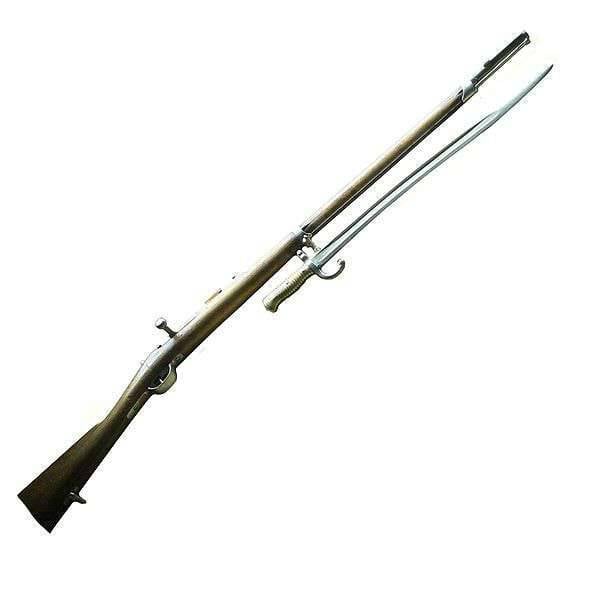
French Rifle Chassepo 1866 of the Year
Prussian needle rifle Dreyze, adopted by 1849 year
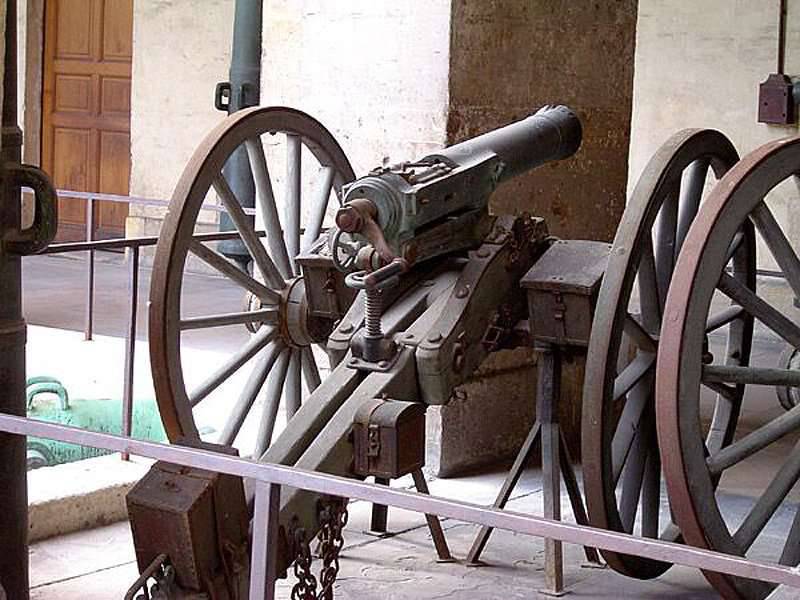
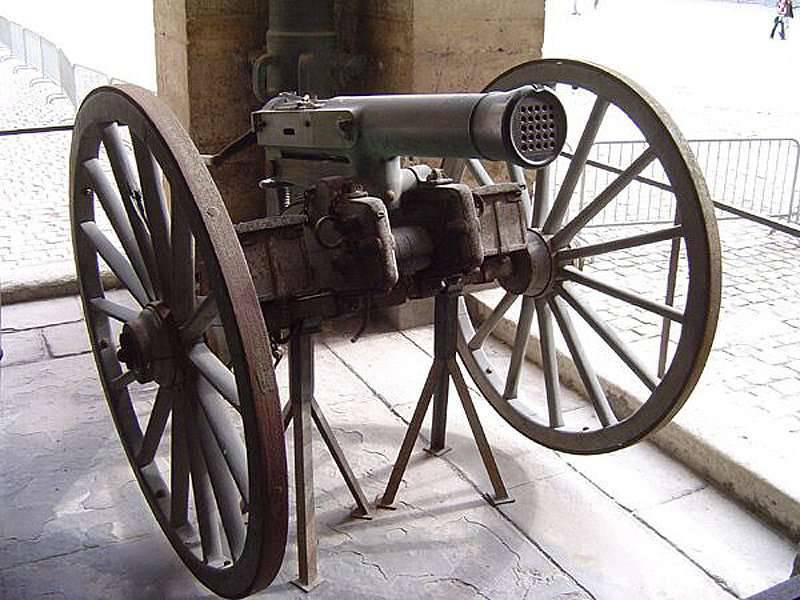
Mitraleza refi
As a result, the French army, which still had the glory of a first-class army, in the war with Prussia could oppose to the enemy mainly glorious traditions and the innate bravery of the soldiers. However, this was not enough to withstand the Prussian military machine. In almost all respects, the Prussian army was stronger. She was not inferior in the fighting spirit and the will to win. After the victories of 1864 and 1866, the Prussian troops had high morale. They fought for the unification of Germany, and the French were officially the aggressors. That is, for the German soldiers it was a just war.
To be continued ...
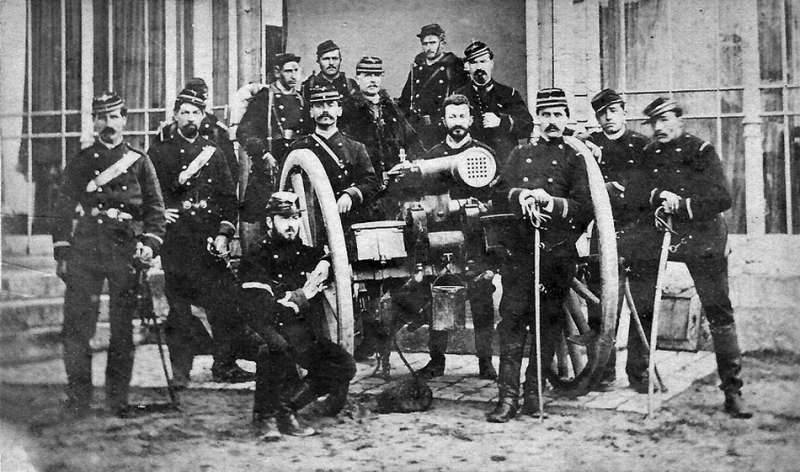
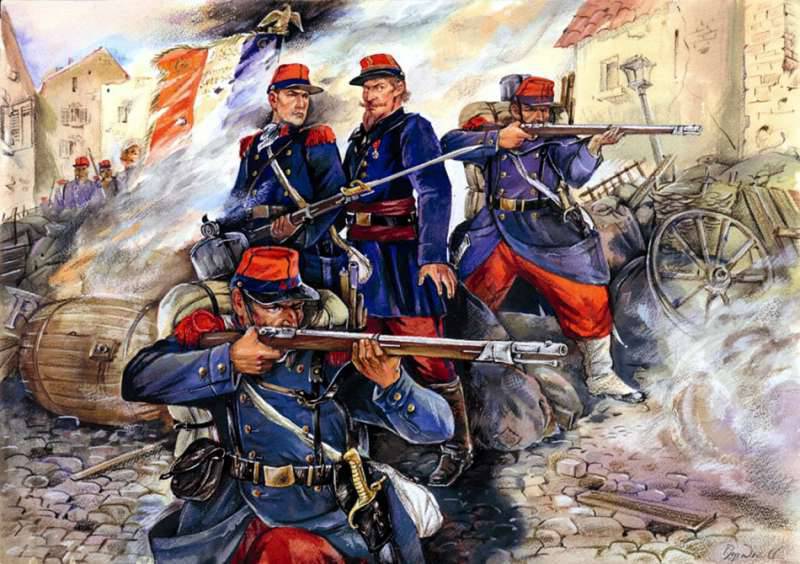
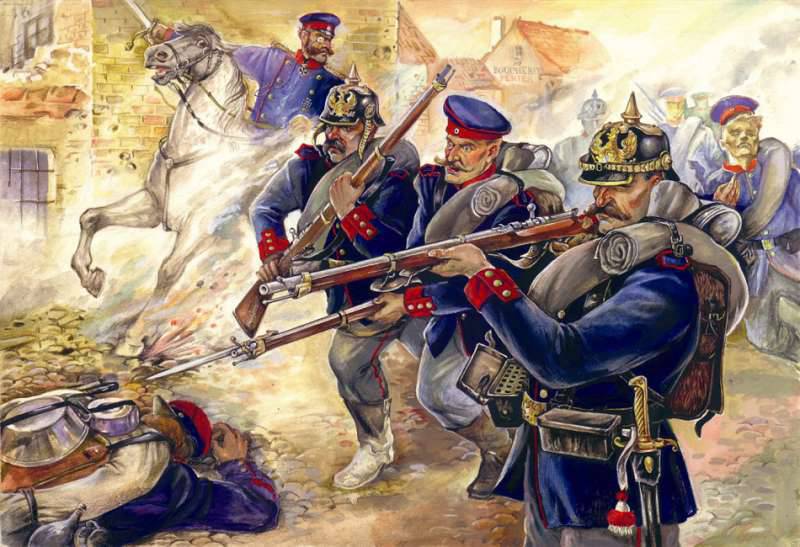
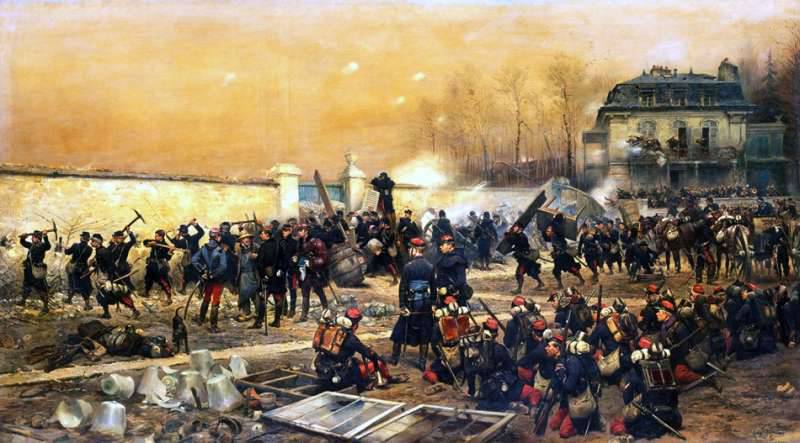
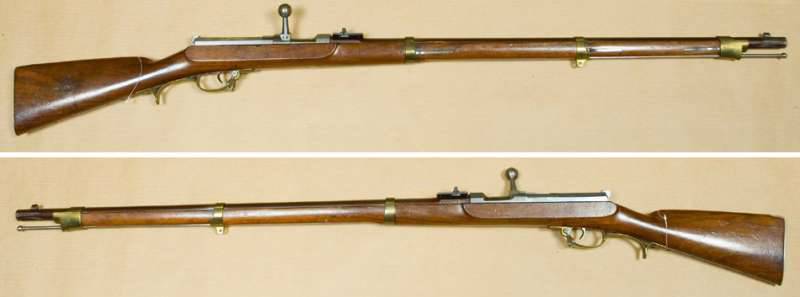
Information